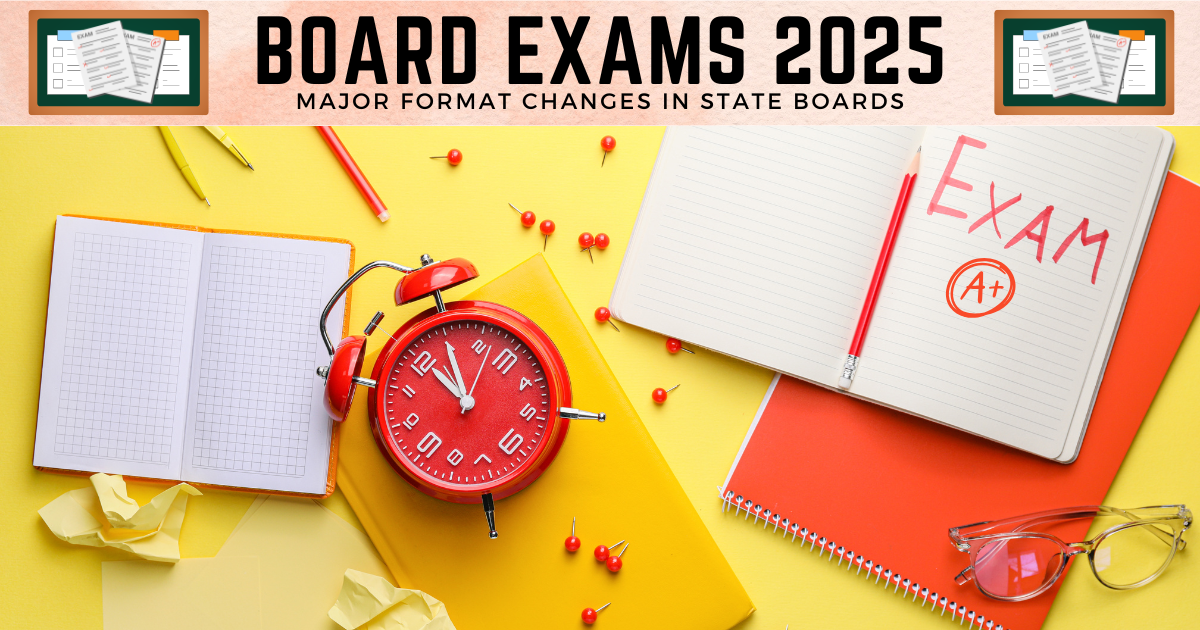Board Exams 2025: Major Format Changes in State Boards. If you are a board student, then you must know about the key changes in the state boards. The government had made major changes in the format of the state board. The Ministry of Education has announced this as a component of the National Education Policy (NEP) 2020. The main aim of these changes is to reduce the high-pressure environment of board exams by allowing students two chances each year. There are more key changes on the board this year. To know more about the topic “Board Exams 2025: Major Format Changes in State Boards,” read the complete article.
Board Exams 2025
The Ministry of Education has declared significant modifications in the board exams in 2025. These changes are made to assist students in many ways in their education. The major changes are made in the class 10 and 12 board exams and will be applied from 2026. These changes will offer students more choices and will reduce the educational pressure. The changes are a part of the objective of the National Education Policy (NEP), emphasizing competency-based learning and student well-being.

The Ministry of Education announced that the State and National Board will conduct class 10 and 12 board exams twice a year from the academic session 2024. Students will be allowed to retain the best score. Along with this, the ministry also announced some major changes in the education system. In accordance with the New Education Policy (NEP 2020), the curriculum as per the New Curriculum Framework is ready.
Major Format Changes in State Boards
The key format changes in the state boards are
Dual Board Exams
The students of classes 10 and 12 will be provided with dual board exam opportunities in an academic year. The first is the Main Examination, the standard exam for all students, while the second is the Improvement Examination, enabling students to retake the exams if they wish to boost their scores.
Enhanced Focus on Competency-Based Questions
The goal of the changes is to promote deeper understanding rather than just learning. From 2026 onwards, exam papers are expected to include more competency-based questions, helping students develop skills like analysis and problem-solving.
More weightage for Internal Assessments
Both State and CBSE boards have placed a higher focus on internal assessments, including projects, assignments, and periodic tests. This change means that consistent performance throughout the academic year can significantly impact overall grades.
Shift Towards Application-Based Learning
The revised examination format focuses on application-based and skill-driven assessments. The new scheme introduces multiple-choice questions (MCQs), with 50% of the questions aimed at testing understanding, 30% focused on application, and 10% on knowledge recall. This approach aims to promote critical thinking and analytical skills among students.
Alignment with NCERT Curriculum
Education department has set a timetable for introducing NCERT-aligned updated syllabus books in schools. For classes 10 and 12, the new curriculum will be introduced in the 2027-28 academic session, as new textbooks are being developed.
No Overall Division, Distinction, or Toppers List
The state board will not award any division or distinction in class 10 and 12 board exams. If a student has offered more than five subjects, the decision to determine the best five subjects may be taken by the admitting institution or employer. There will be no toppers list released to declare the best-performing students.
Increased Security Measures
State board has implemented stringent security protocols, including biometric authentication, digital fingerprinting, and face matching, to ensure the integrity of the examination process. The government has adopted a zero-tolerance policy against cheating and is taking every possible step to maintain the integrity of the exams.
Inclusion of Punjabi as a Regional Language
Punjabi will be added as a regional language option in the revised exam scheme, effective from next year. This expansion will allow students to select one regional or foreign language for their exams, in line with the scheme’s goal of providing more language choices.
Roles and Responsibilities of State Board
- Look out for the implementation of various education policies as per the norms set by the Central Government.
- Maintain the uniformity of education across all state board schools.
- Lay down the guiding principles for all the syllabi and curriculum.
- Conduct the board examinations when students are on the verge of completing their secondary or higher secondary education.
- Provide certifications for all students who pass the examination.
- Establish the conditions to schools regarding admissions of private and regular students.

Mark Delyn focuses on education, learning methods, and academic trends. Her work supports students, educators, and lifelong learners with practical and timely insights.







